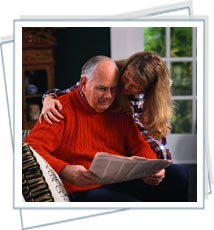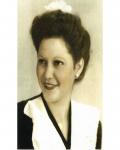Death is difficult for everyone. Even if you have experienced a loss yourself it is still difficult to console someone close to you who has suffered a loss. Below are some tips and suggestions on how you can help the bereaved. First a short explanation of grief will help you better apply the material that follows.
A Definition of Grief
The physical, emotional and mental condition brought on by a loss, such as the death of someone you love, is called grief. Grief is our body's natural ability to heal our emotional injury. Grieving can be hard. Lack of understanding makes it harder. Grief is a personal process characterized by three phases. The first phase is Shock (denial). This begins with the news of the death, but the reality of the death may occur in a few minutes, a few days or even several months later. This phase "protects" the survivor from the emotional impact of the death. A need to stay busy, confusion, an inability to express emotion, inability to function and an overwhelming sense that something is wrong without grasping the reality of the loss are common characteristics of this phase. The second phase is the expression of grief (i.e. bargaining, anger, depression) and may last for several days to several years. There are mental, physical and emotional manifestations that may come and go or appear in any combination. • Mental: Preoccupation with the death, inability to focus, remember, lack of productivity, paranoia or, inconsistent thoughts. • Physical: Fatigue, weakness, insomnia, weight gain or loss, headaches, tendency to catch stress-related illnesses, a sense of vulnerability, discomfort with too much activity or stimulation. • Emotional: Intense sadness, fear, anxiety, anger, depression, loneliness, confusion, helplessness, isolation and guilt. The inability to feel love or give love, compulsive behavior, thinking that you are "crazy". If an individual is experiencing these symptoms, realize that they are quite normal and in many ways are a necessary part of the healing process of grief. If however, you feel the individual is experiencing these conditions acutely and is not able to handle the grief on their own, professional help might be needed. The third and final stage is Acceptance. You will know when the individual has reached this stage when they are able to recall memories of their deceased loved one fondly and pleasantly instead of painfully. Once acceptance has been reached, planning for the future becomes more realistic. A new and wiser individual will have emerged.
How You Can Help Before the Funeral (sometimes it is best not to offer or ask but to just do it)
- Offer to notify his family and friends about funeral arrangements
- House-sit to prevent burglaries during the funeral and visitations
- Help answering the phone and greeting visitors
- Keep a record of everyone who calls, visits or has been contacted
- Help coordinate the food and drink supply
- Offer to pick up friends and family at the airport. Arrange housing
- Offer to provide transportation for out-of-town visitors
- Help him keep the house cleaned and the dishes washed
After the Funeral (consider doing these every week for two to three months)
- Prepare or provide dinner on a day that is mutually acceptable.
- Offer to help with yard chores such as watering or pruning
- Feed and exercise the pets, if any
- Write notes offering encouragement and support
- Offer to drive or accompany him to the cemetery regularly
- Offer to house sit so he can get away or visit family out of town
- Make a weekly run to the grocery store, laundry, or cleaners
- Help with the Thank You notes and/or other correspondence
- Anticipate difficult periods such as anniversaries, birthdays, holidays, and the day of death
- Always mention the deceased by name and encourage reminiscing
What You Should Say and Do
- Say "I'm sorry"
- Give them the opportunity to talk about the deceased
- Allow them to share their memories
- Use the deceased person's name
- Validate that grieving is normal
- Ask them how you can help
Remember, the best support you can offer the bereaved is to listen and be understanding. You don't need to say much. You just need to be there for them.
DO NOT Say
- I know just how you feel.
- Time heals all wounds.
- Aren't you happy he's in heaven?
- You're lucky your baby's in heaven with God.
Because
- No one can truly know what another feels.
- Time alone does not heal the pain.
- This fails to honor the deep suffering of the bereaved. Although they may be comforted by their faith, the pain of missing loved ones is the present reality.
DO NOT Say
- Be thankful he was not aware at the end.
- He (or she) had a good life.
Because
- We are discussing the death from our perspective, not from that of the bereaved. This discounts the grieving person's pain.
DO NOT Say
- Things will be back to normal in a month or two.
- Now you need to get on with your life.
Because
- This puts limits on a person's grief.
- Each person needs to grieve in his or her own time and way.
DO NOT Say
- He was only a baby - you really didn't get that attached to him.
- Your mother was pretty old – did you think she'd live forever?
- She was only your friend.
Because
- We cannot judge the depth of the relationship one person has for another.
- Each person is irreplaceable.
DO NOT Say
- You can’t stay sad forever.
- He wouldn't want you to be sad.
Because
- You deny the fact that being sad and expressing strong emotions is a very necessary part of healing.
Funeral Etiquette
Although common sense and good discretion are always the best guides to proper funeral etiquette, a few principles apply.
Visitations & Services
Upon learning of a death, close friends of the bereaving family if possible should visit the family's home to offer sympathy and assistance – this is sometimes referred to as a condolence visit. It may include helping with food preparation and child care. The visit can take place any time within the first few weeks of death, and may be followed with one or more additional visits, depending on the circumstances and your relationship with the family.
In addition to expressing sympathy it is appropriate, if desired, to relate to family members your fond memories of the deceased. In some cases friends and family members may simply want you to be a good listener to their expressions of grief or memories of the deceased. In most circumstances it is not appropriate to inquire as to the cause of death.
It is customary to show your respects by viewing the deceased if the body is present and the casket is open. You may wish to say a silent prayer for, or meditate about, the deceased at this time. In some cases the family may escort you to the casket.
The length of your stay at the visitation or funeral/graveside service or reception is a matter of discretion. After visiting with the family and viewing the deceased you can visit with others in attendance. Normally there is a register for visitors to sign and the family generally appreciates it if you would sign it.
As with other aspects of modern day society funeral dress codes have relaxed somewhat. Black dress is no longer required. Instead subdued or darker hues should be selected, the more conservative the better. After the funeral the family often receives invited visitors to their home for pleasant conversation and refreshments.
Flowers & Charitable Donations
You can send flowers to the funeral home prior to the funeral, or to the family residence at any time. In some cases flowers may also be sent to Protestant churches. (Flowers generally are not sent to Jewish synagogues and Catholic churches.)
Charitable gifts in memory of the deceased are often made, particularly when the family has requested gifts to be made in lieu of flowers. The family is notified of the gifts by personal note from the donor or by the charity or other organization. In the latter case the donor provides the family's name and address to the charity at the time the gift is made.
It is usually acceptable to send flowers even when the obituary or death notice states, “in lieu of flowers, please make a contribution to …”. Flowers at the funeral service not only add warmth and life to a somber event, they are a tangible tribute. They let the bereaved know, visibly, how much their loved one touched the lives of others. Just as we would not send sympathy cards, offer assistance, or donate food when asked to make a financial contribution, flowers are always appropriate and appreciated.
Even if you don’t send flowers or make a charitable contribution, a note or card to the deceased's family expressing your thoughts of the deceased is a welcomed gesture, especially if you weren't able to attend the funeral.





























